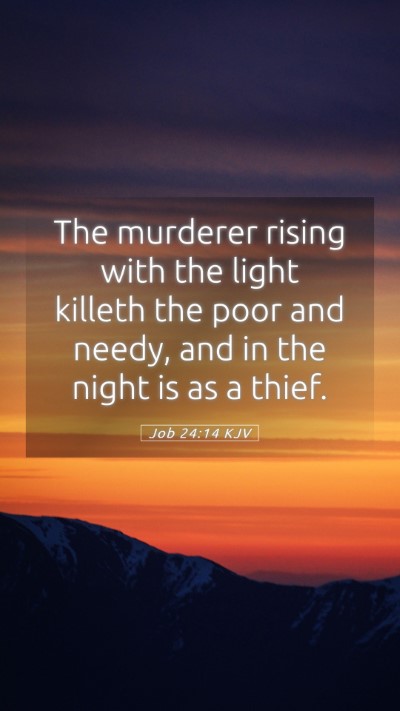Old Testament
Genesis Exodus Leviticus Numbers Deuteronomy Joshua Judges Ruth 1 Samuel 2 Samuel 1 Kings 2 Kings 1 Chronicles 2 Chronicles Ezra Nehemiah Esther Job Psalms Proverbs Ecclesiastes Song of Solomon Isaiah Jeremiah Lamentations Ezekiel Daniel Hosea Joel Amos Obadiah Jonah Micah Nahum Habakkuk Zephaniah Haggai Zechariah MalachiJob 24:14 Meaning
What is the meaning of Job 24:14?
The murderer rising with the light killeth the poor and needy, and in the night is as a thief.
Job 24:14 Bible Verse Meaning
Understanding Job 24:14
Job 24:14 states, "The murderer rising with the light killeth the poor and needy, and in the night is as a thief." This verse highlights the theme of injustice and the moral decay present in society, emphasizing how the wicked perpetrate their evil deeds without fear of repercussions.
Bible Verse Meanings
This passage reflects Job's lament regarding the absence of divine justice in the world. In his discourse, he observes that sin and violence are prevalent, especially among the powerful and the oppressors. Despite the clarity of their wrongdoing, the wicked often act as if their actions are cloaked in darkness, evading punishment.
Bible Verse Commentary
- Matthew Henry's Commentary: Henry emphasizes that the wicked, such as murderers, act with blatant disregard for life and morality. The contrast between light and darkness serves as a metaphor for knowledge and ignorance, where evil-doers operate in the shadows, believing they can escape the light of God’s judgment.
- Albert Barnes': Barnes expands on the idea that the deeds committed in darkness reflect a deeper spiritual blindness. He illustrates that the fear of punishment does not deter these individuals, which leads to a culture of fear and insecurity among the innocent.
- Adam Clarke's Commentary: Clarke provides an analysis of the psychological motivations behind why individuals commit such crimes. He notes that desperation and greed often compel people to harm others, particularly the vulnerable, indicating a societal collapse of ethics and compassion.
Scripture Analysis
The verse serves as a poignant reminder of the struggles faced not only by Job but by society at large in coping with perceived injustice. It calls into question the nature of God’s justice and the seeming prosperity of the wicked while the righteous suffer.
Significance of Job 24:14
This verse embodies the broader themes found throughout the Book of Job, particularly the exploration of suffering, justice, and the human condition. It prompts readers to reflect on the consequences of sin and the importance of moral integrity.
Applying the Verse to Daily Life
For modern readers, Job 24:14 challenges us to consider our own responses to injustice and suffering. It asks us how we can be advocates for those who are oppressed and how we must stand against wickedness in our own spheres of influence. It also serves as a caution against complacency regarding societal wrongs.
Related Bible Cross References
- Genesis 4:8 - The story of Cain and Abel, an early instance of murder and its implications.
- Psalm 73 - Addresses the problem of the prosperity of the wicked versus the suffering of the righteous.
- Ecclesiastes 8:14 - Discusses the apparent injustices in the world and how the righteous sometimes suffer while the wicked thrive.
- Isaiah 59:7-8 - Speaks to the unrighteousness and violence found in human hearts.
- Matthew 5:38-39 - Jesus' teaching on turning the other cheek and dealing with evil.
Conclusion
Job 24:14 serves as a critical piece of scripture that speaks to the heart of human experiences with evil, justice, and the challenges of faith. It urges careful reflection and a commitment to moral living, as well as support for those who are vulnerable to violence and oppression. Through this passage, we are reminded of the ongoing relevance of Biblical exegesis and the importance of understanding scripture in the context of contemporary societal issues.


